By Peter Nurse
Investing.com - The U.S. dollar edged higher in early European trade Thursday, stabilizing after earlier losses as growing recession worries resulted in Treasury yields retreating.
At 3:10 AM ET (0710 GMT), the Dollar Index, which tracks the greenback against a basket of six other currencies, traded marginally higher at 104.010, having fallen substantially from the two-decade peak of 105.79 reached on June 15, when the Federal Reserve raised rates by 75 basis points.
The dollar has slipped from that peak as markets have become increasingly concerned that the Fed's attempt to curb historically high inflation with aggressive monetary tightening will result in a recession.
Fed Chair Jerome Powell added to these concerns on the first day of his two-day testimony to Congress, stating that while it wasn’t what the central bank policy makers were aiming for, a recession was "certainly a possibility" as they attempted to bring prices under control.
Those worries sent the 10-year Treasury yields sliding to an almost two-week low, before rebounding marginally in early European hours.
Powell continues his testimony later Thursday, while on the data front, the weekly U.S. initial jobless claims are due.
“We have another day of Powell testimony on the Hill this evening, so stand by for more intraday choppiness and analysis paralysis of his every word,” said Jeffrey Halley, an analyst at OANDA.
EUR/USD fell 0.2% to 1.0549, GBP/USD fell 0.4% to 1.2214, after data showed that the U.K. government borrowed more than forecast in May after a 70% surge in interest payments to service the national debt, while the risk sensitive AUD/USD dropped 0.6% to 0.6887.
Additionally, USD/JPY fell 0.4% to 135.71, retreating from a 24-year high of 136.71 reached on Wednesday, with the yen helped by the narrowing of the gap between yields on Japanese government bonds and U.S. Treasuries.
Also weighing on the pair were comments from Takehiko Nakao, former head of foreign exchange policy at the finance ministry, who stated that the possibility of Japan intervening directly in currency markets to stem the yen’s slide can’t be ruled out.
